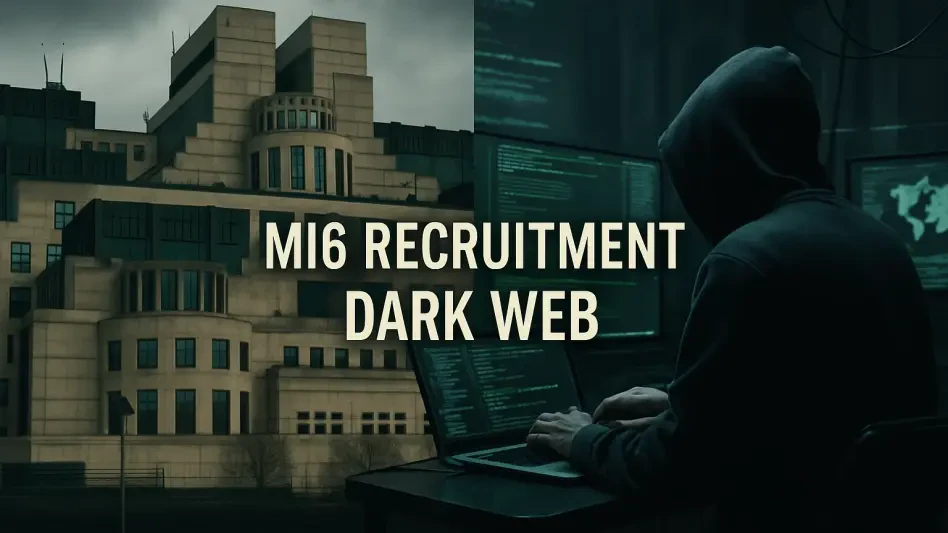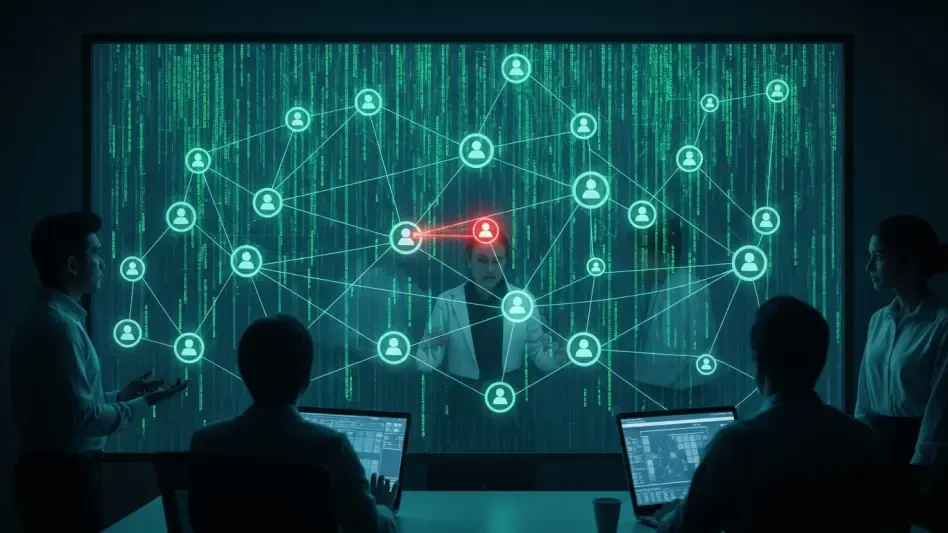In a striking development that redefines the shadowy world of espionage, Britain’s premier intelligence agency, MI6, has rolled out an audacious new tool known as Silent Courier, a dark web portal specifically designed to recruit foreign informants with a particular emphasis on Russian sources. This cutting-edge platform, accessible through the anonymity-protecting Tor network, marks a dramatic departure from the traditional, often risky face-to-face methods of spy recruitment. By harnessing the hidden depths of the internet, MI6 seeks to connect with potential operatives across the globe while shielding their identities from prying eyes. This move not only reflects the growing intersection of technology and intelligence but also underscores the agency’s determination to stay ahead in a rapidly evolving digital landscape. As geopolitical tensions simmer, particularly with Russia, Silent Courier emerges as a bold strategy to gather critical information in a world where physical borders are increasingly irrelevant to the craft of spying.
Digital Shift in Espionage Tactics
Silent Courier represents a profound transformation in how intelligence agencies operate, moving away from clandestine meetings in dimly lit alleys to secure, anonymous digital interactions. This dark web portal allows MI6 to reach out to potential informants in regions where direct contact could prove fatal, effectively bypassing the dangers of physical exposure. The initiative is a testament to the power of technology to transcend geographical limitations, enabling communication with individuals who might otherwise remain out of reach. British Foreign Secretary Yvette Cooper has emphasized the platform’s potential to significantly enhance the UK’s intelligence-gathering capabilities, especially in adversarial territories. By leveraging the Tor network’s anonymity features, MI6 can cast a wider net, tapping into a diverse pool of sources who can provide invaluable insights without ever stepping into a British embassy or meeting an operative in person.
This digital pivot also reflects broader trends within the intelligence community, where adapting to technological advancements is no longer optional but essential for maintaining a competitive edge. Silent Courier’s design prioritizes discretion, ensuring that communications remain hidden from hostile surveillance. However, this shift raises questions about the reliability of virtual interactions compared to traditional methods, where personal rapport often played a key role in assessing an informant’s credibility. The platform’s success will likely depend on MI6’s ability to verify the authenticity of information received through such impersonal channels. As espionage enters this new frontier, the balance between technological innovation and the human element of intelligence work becomes a critical point of focus, shaping how agencies approach recruitment in an era dominated by digital connectivity.
Security Challenges on the Dark Web
While the dark web offers a cloak of anonymity, engaging with Silent Courier comes with substantial risks that potential informants must navigate with extreme caution. Accessing the portal often requires bypassing restrictions on Tor in certain countries, which necessitates the use of VPNs to mask online activity. Moreover, individuals must avoid using traceable payment methods, such as credit cards, when subscribing to these services, as even a small digital footprint could lead to exposure. The importance of maintaining updated devices and employing private browsing modes cannot be overstated, as these measures help shield against detection by hostile entities. This intricate web of precautions highlights the inherent tension between leveraging advanced technology for espionage and ensuring the safety of those who dare to engage with it.
Beyond technical safeguards, the broader security implications of operating on the dark web pose a constant challenge for MI6. The very anonymity that protects informants can also obscure malicious actors, potentially leading to misinformation or deliberate traps set by adversarial intelligence services. Historical precedents show that digital platforms, no matter how secure they seem, are not immune to breaches, and the stakes in espionage are extraordinarily high. A single lapse could jeopardize not only the individual informant but also the entire operation, exposing MI6 to significant vulnerabilities. Thus, while Silent Courier offers a groundbreaking avenue for recruitment, it demands rigorous oversight and continuous updates to security protocols to prevent catastrophic failures, ensuring that the promise of anonymity does not become a double-edged sword in the hands of those it aims to protect.
Lessons from Historical Failures
The ambitious rollout of Silent Courier is not without the sobering backdrop of past digital espionage failures, particularly those experienced by the CIA, which serve as cautionary tales for MI6. Years ago, the CIA operated covert websites disguised as innocuous platforms, such as fan pages for popular franchises, only to have these operations unraveled by Iranian intelligence. The exposure of these digital fronts led to severe consequences, including the compromise of critical assets and networks. These missteps underscore the fragility of online espionage tools when security measures fail to keep pace with evolving threats. For MI6, these historical lessons emphasize the necessity of implementing robust safeguards to protect Silent Courier from similar fates, ensuring that anonymity does not become a liability.
Reflecting on these past errors also highlights the evolving nature of cyber threats that intelligence agencies must confront in the digital age. The CIA’s experience revealed how even the most carefully crafted online operations can be penetrated if adversaries dedicate sufficient resources to uncovering them. For Silent Courier to succeed, MI6 must anticipate and adapt to sophisticated counterintelligence tactics that could exploit vulnerabilities in dark web interactions. This means not only fortifying the technical infrastructure of the portal but also training operatives to detect and mitigate risks in real time. The shadow of previous failures looms as a reminder that innovation in espionage must be matched by an unwavering commitment to security, lest history repeat itself with devastating consequences for the UK’s intelligence efforts.
Geopolitical Implications and Strategic Goals
The focus of Silent Courier on recruiting Russian informants is far more than a technological endeavor; it represents a calculated geopolitical maneuver amid escalating tensions with Russia. As a key adversary, Russia remains a priority for Western intelligence agencies seeking to uncover strategic insights into its military, political, and economic activities. MI6’s decision to target sources within this region aligns with the UK’s broader national security objectives, aiming to bolster defenses against potential threats through actionable intelligence. The dark web portal offers a discreet channel to connect with individuals who might possess critical information, providing a unique opportunity to penetrate otherwise inaccessible networks in a highly guarded state.
Yet, this strategic focus also brings ethical and operational dilemmas to the forefront. The anonymity that Silent Courier provides, while essential for protecting informants, can complicate efforts to verify the credibility of the information received. Without the ability to establish trust through personal interaction, MI6 faces the risk of being misled by double agents or fabricated data, a concern amplified in the context of Russia’s known proficiency in disinformation campaigns. Additionally, the ethical implications of soliciting information through such shadowy means raise questions about accountability and the potential misuse of the platform. As MI6 navigates these challenges, the geopolitical stakes of Silent Courier underscore the delicate balance between gaining a strategic advantage and maintaining integrity in intelligence operations.
Shaping the Future of Spy Craft
Silent Courier stands as a harbinger of how technological advancements are poised to redefine the landscape of espionage on a global scale. The integration of digital tools like this dark web portal opens up unprecedented avenues for expanding the reach of intelligence agencies, allowing them to connect with sources in ways previously unimaginable. At the same time, it enhances security by minimizing physical risks associated with traditional recruitment methods. However, these advancements come with complex challenges, particularly around privacy and the safety of operations in an environment where digital footprints can be traced by determined adversaries. The trajectory of such initiatives will likely influence whether other agencies adopt similar strategies or remain cautious due to inherent risks.
Looking forward, the success of Silent Courier could pave the way for a hybrid model of intelligence gathering, blending cutting-edge technology with the irreplaceable value of human insight. The ability to operate anonymously online offers a significant advantage, but it must be complemented by mechanisms to ensure the reliability of recruited sources. Furthermore, the ethical considerations of digital espionage—balancing national security needs with individual rights—will continue to shape policy and public discourse. As MI6 pioneers this approach, the broader intelligence community watches closely, recognizing that the future of spy craft may hinge on mastering the interplay between innovation and vigilance in an increasingly connected world.
Reflecting on a New Era of Intelligence
In retrospect, MI6’s deployment of Silent Courier marked a pivotal moment in the annals of espionage, as the agency embraced the dark web to recruit informants under the veil of digital anonymity. This daring initiative showcased a willingness to adapt to modern challenges, particularly in targeting critical information from regions like Russia during a time of heightened global friction. The balance of technological promise against the backdrop of past digital failures by other agencies highlighted the cautious optimism that accompanied this venture. Security concerns and geopolitical strategies intertwined, painting a complex picture of intelligence work in a digital age. Moving forward, the lessons learned from this endeavor pointed to a need for relentless innovation paired with stringent safeguards. The path ahead for MI6 and similar agencies appeared to lie in refining these digital tools, ensuring they enhance rather than endanger global security efforts, while continuously adapting to the ever-shifting landscape of cyber threats.








